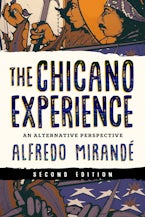“The Xaripu Community is an exciting, refreshing, and critical ethnographic study that breaks new ground for theorizing transnational migration experiences and gender relationships across borders and challenges monolithic characterizations of Mexican migrants. Presenting a nuanced critique of previous frameworks, Barajas puts forward innovative assertions and arguments for an ‘interactive colonization’ framework that will have repercussions on debates about the Mexican migration experience in the United States.” —Mary Romero, Arizona State University
“This interesting work aims to develop a framework for understanding how the intersection of racism, patriarchy, and economic oppression affects labor migration, community formation, and gender dynamics among the Xaripu across borders. It contributes to our understanding of another facet of the Mexican experience of migration.” —Cecilia Menjivar editor of Latinos/as in the United States: Changing the Face of América
“Manuel Barajas does a masterful job of integrating various theoretical perspectives to provide us a more sophisticated understanding of one particular transnational community. His model of interactive colonialism draws from such diverse conceptual and methodological traditions as neocolonialism and internal colonialism, globalization theory, network theory, gender relations, and historical materialism. At the same time, his approach is firmly grounded in the specific experience of the transborder Xaripu community, based in both Mexico and California. The complexity of his framework is a necessary reflection of the multiple economic and social factors that are shaping this type of emergent globalized community.” —Mario Barrera, University of California, Berkeley
“Barajas presents an extended case study of the migration experiences of the Xaripu community originating from Michoacan, Mexico. He examines how forms of colonialism, institutional biases, and emergent forms of domination have shaped the community’s labor migration, community formation, and family experiences across the Mexican/US border over the course of a century.” —Research Book News
“This is a very good book that will appeal to Mexican American historians, sociologists, and those interested in the experiences of Mexican immigrants. What makes this study unique is the binational, cross-border comparative perspective. Barajas does what only a handful of Mexican/Mexican American scholars have done; he shows the ways in which the home country has continued to influence and reinforce the social and cultural identity of immigrants.” —Journal of American Ethnic History
" . . . by using he case of Xaripus on both sides of the border and the different forms of subordination over time, this is a much-needed book that makes critical contributions to the study of migration, families, gender and Latinos in the United States." —Bulletin of Latin American Research
". . . a major contribution of the book, besides the analysis of Xaripu migration to the United States, is that it offers ethnographic materials that help differentiate indigenous from mestizo migration. It is a useful book for advanced undergraduate and graduate studies in migration." —Social Forces








